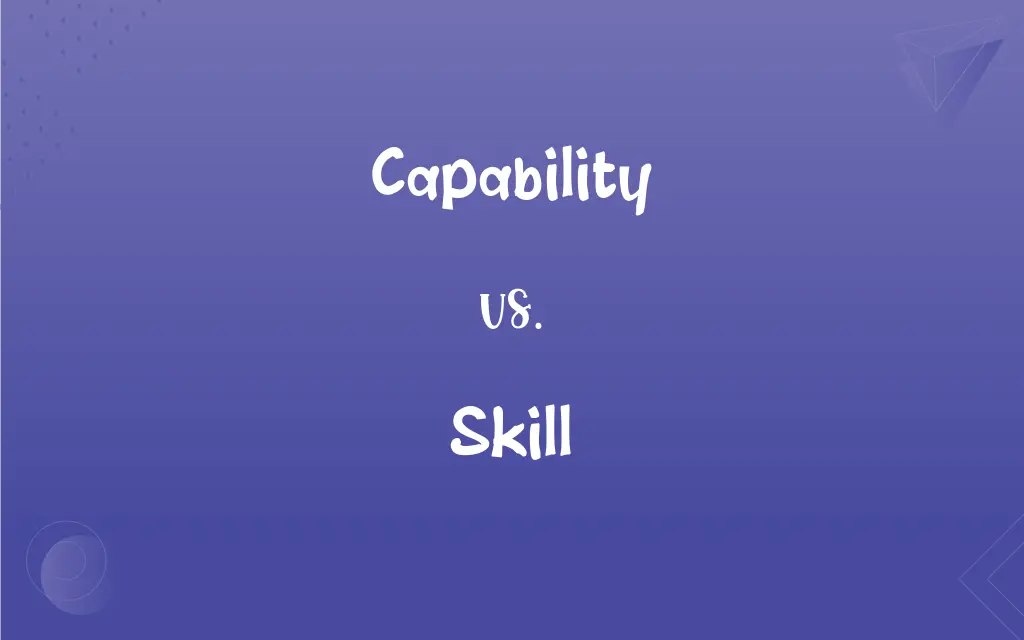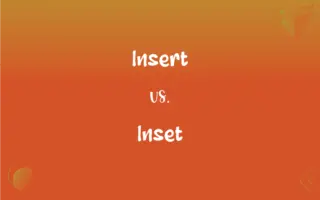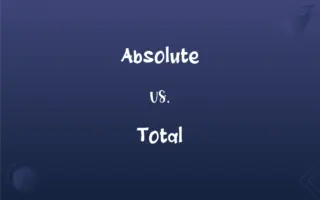Capability vs. Skill: What's the Difference?
Edited by Harlon Moss || By Janet White || Updated on October 7, 2023
Capability refers to the ability or potential to perform a task or function, while skill is the proficiency or expertise acquired through training or experience.

Key Differences
Capability denotes an individual’s or a system’s inherent ability or potential to perform tasks, solve problems, or achieve objectives. It is a measure of the capacity and potential that exists, even if it is latent or undeveloped. Skill, on the other hand, refers to the proficiency, expertise, or competence that one gains through experience, training, or practice. It’s the learned ability to carry out a task with pre-determined results often within a given amount of time, energy, or both.
In the context of organizational functionality, capability often relates to the potential or ability of an organization or a team to achieve its objectives, considering resources, conditions, and constraints. It’s about what can possibly be achieved. Conversely, skill in an organizational setting is often associated with the specific abilities and competencies of its members, gained through education and experience, enabling the accomplishment of tasks and the solving of problems.
When discussing human potential, capability may be seen as innate, representing the inherent ability or aptitude that one may possess. It may be broad, encompassing the potential to develop various skills. In contrast, skill is more specialized and is developed and refined over time through learning and practice, reflecting one's expertise and competence in specific areas or tasks.
While capability is a broader term referring to potential and inherent abilities, skill is more about the refinement of these abilities through learning and experience. A person may have the capability to learn multiple languages due to innate aptitude, but the skill of speaking a specific language is acquired and honed over time through dedicated effort and practice.
Comparison Chart
Nature
Inherent, potential ability.
Acquired, developed proficiency.
ADVERTISEMENT
Development
May exist latently; can be developed.
Developed through practice, experience, or training.
Specificity
Generally broad and encompassing.
Usually specific to a task or subject.
Application
Refers to the potential to perform tasks.
Demonstrates the ability to effectively perform tasks.
Dependency
Independent of experience.
Depends on experience and learning.
Capability and Skill Definitions
Capability
The ability or potential to do something.
She has the capability to become a renowned musician.
ADVERTISEMENT
Skill
The ability to do something well; expertise or proficiency.
Her skill in painting is remarkable.
Capability
The maximum that can be produced.
The factory is running at full capability.
Skill
The technique or ability in using one's knowledge effectively and readily in execution or performance.
With great skill, he resolved the complex equation.
Capability
The power or ability to generate an outcome.
The team has the capability to win the championship.
Skill
A particular ability or type of proficiency acquired through training or experience.
Playing the piano is a skill he has honed for years.
Capability
The feature or characteristic that enables functioning.
This device has the capability of fast charging.
Skill
A developed talent or ability.
His skill in negotiation helped in reaching an agreement.
Capability
A talent or ability that has potential for development or use.
He showed great capability in solving complex problems.
Skill
Proficiency, facility, or dexterity that is acquired or developed through training or experience
Painted with great skill.
Capability
The quality of being capable; ability.
Skill
A developed talent or ability
Improved his writing skills.
Capability
Often capabilities A talent or ability that has potential for development or use
A student of great capabilities.
Skill
An art, trade, or technique, particularly one requiring use of the hands or body
The skill of glassmaking.
Capability
The capacity to be used, treated, or developed for a specific purpose
Nuclear capability.
Skill
(Obsolete) A reason; a cause.
Capability
The power or ability to generate an outcome
Skill
Capacity to do something well; technique, ability. Skills are usually acquired or learned, as opposed to abilities, which are often thought of as innate.
Where did you pick up that skill?
With great skill, she navigated through the tricky passage.
Doing that coaching course not only taught me useful skills on the field, but also some important life skills.
Capability
(computing) A digital token allowing a user or process to interact in a specified way with an object that is subject to access control.
Skill
(obsolete) Discrimination; judgment; propriety; reason; cause.
Capability
The quality of being capable; capacity; capableness; esp. intellectual power or ability.
A capability to take a thousand views of a subject.
Skill
(obsolete) Knowledge; understanding.
Capability
Capacity of being used or improved.
Skill
(obsolete) Display of art; exercise of ability; contrivance; address.
Capability
The quality of being capable -- physically or intellectually or legally;
He worked to the limits of his capability
Skill
Great, excellent.
Capability
The susceptibility of something to a particular treatment;
The capability of a metal to be fused
Skill
(transitive) To set apart; separate.
Capability
An aptitude that may be developed
Skill
To discern; have knowledge or understanding; to know how (to).
Skill
To know; to understand.
Skill
(intransitive) To have knowledge or comprehension; discern.
Skill
(intransitive) To have personal or practical knowledge; be versed or practised; be expert or dextrous.
Skill
To make a difference; signify; matter.
Skill
(video games) To spend acquired points in exchange for skills.
Skill
Discrimination; judgment; propriety; reason; cause.
For great skill is, he prove that he wrought.
Skill
Knowledge; understanding.
That by his fellowship he color mightBoth his estate and love from skill of any wight.
Nor want we skill or art.
Skill
The familiar knowledge of any art or science, united with readiness and dexterity in execution or performance, or in the application of the art or science to practical purposes; power to discern and execute; ability to perceive and perform; expertness; aptitude; as, the skill of a mathematician, physician, surgeon, mechanic, etc.
Phocion, . . . by his great wisdom and skill at negotiations, diverted Alexander from the conquest of Athens.
Where patience her sweet skill imparts.
Skill
Display of art; exercise of ability; contrivance; address.
Richard . . . by a thousand princely skills, gathering so much corn as if he meant not to return.
Skill
Any particular art.
Learned in one skill, and in another kind of learning unskillful.
Skill
To know; to understand.
To skill the arts of expressing our mind.
Skill
To be knowing; to have understanding; to be dexterous in performance.
I can not skill of these thy ways.
Skill
To make a difference; to signify; to matter; - used impersonally.
What skills it, if a bag of stones or goldAbout thy neck do drown thee?
It skills not talking of it.
Skill
An ability that has been acquired by training
Skill
Ability to produce solutions in some problem domain;
The skill of a well-trained boxer
The sweet science of pugilism
Skill
A learned power of doing a thing competently.
Writing is a skill that requires practice and patience.
FAQs
Is capability more about potential?
Yes, capability often refers to inherent or latent potential or ability.
Can one have capability but lack skill?
Yes, one may have the inherent capability or potential but may lack the refined skill due to lack of experience or training.
Is skill acquired through experience?
Yes, skill is typically acquired and honed through experience, training, or practice.
Are capability and skill synonymous?
They are related but not synonymous; capability is the potential or ability to do something, while skill is the learned ability or proficiency.
Can an organization have capabilities?
Yes, organizations have capabilities, referring to their potential to achieve objectives considering their resources and conditions.
Is capability related to features in technology?
Yes, in technology, capability can refer to the features or characteristics that enable functioning.
Can one acquire skills without inherent capability?
While inherent capability can be advantageous, skills can often be acquired through dedication, practice, and learning even without it.
Can skills be transferred between different tasks?
Some skills are transferable and can be applied to different tasks, while others are very task-specific.
Can skills be specific to a task or subject?
Absolutely, skills are often specific, reflecting proficiency or expertise in a particular task or subject.
Are skills measurable?
Skills are generally measurable, often assessed based on one’s ability to perform specific tasks proficiently.
Does capability always lead to the development of skill?
Not always; capability represents potential, but developing it into skill requires effort, learning, and practice.
Can capability be developed into skill?
Yes, inherent capability can be developed and refined into skill through learning and practice.
Can capabilities be innate?
Yes, capabilities can be innate, representing inherent abilities or aptitudes.
Are capabilities broad in nature?
Generally, yes. Capabilities are often broad, representing the potential to develop various skills.
Can skills be improved over time?
Absolutely, skills can be enhanced and refined over time through continuous learning and practice.
About Author
Written by
Janet WhiteJanet White has been an esteemed writer and blogger for Difference Wiki. Holding a Master's degree in Science and Medical Journalism from the prestigious Boston University, she has consistently demonstrated her expertise and passion for her field. When she's not immersed in her work, Janet relishes her time exercising, delving into a good book, and cherishing moments with friends and family.
Edited by
Harlon MossHarlon is a seasoned quality moderator and accomplished content writer for Difference Wiki. An alumnus of the prestigious University of California, he earned his degree in Computer Science. Leveraging his academic background, Harlon brings a meticulous and informed perspective to his work, ensuring content accuracy and excellence.































































